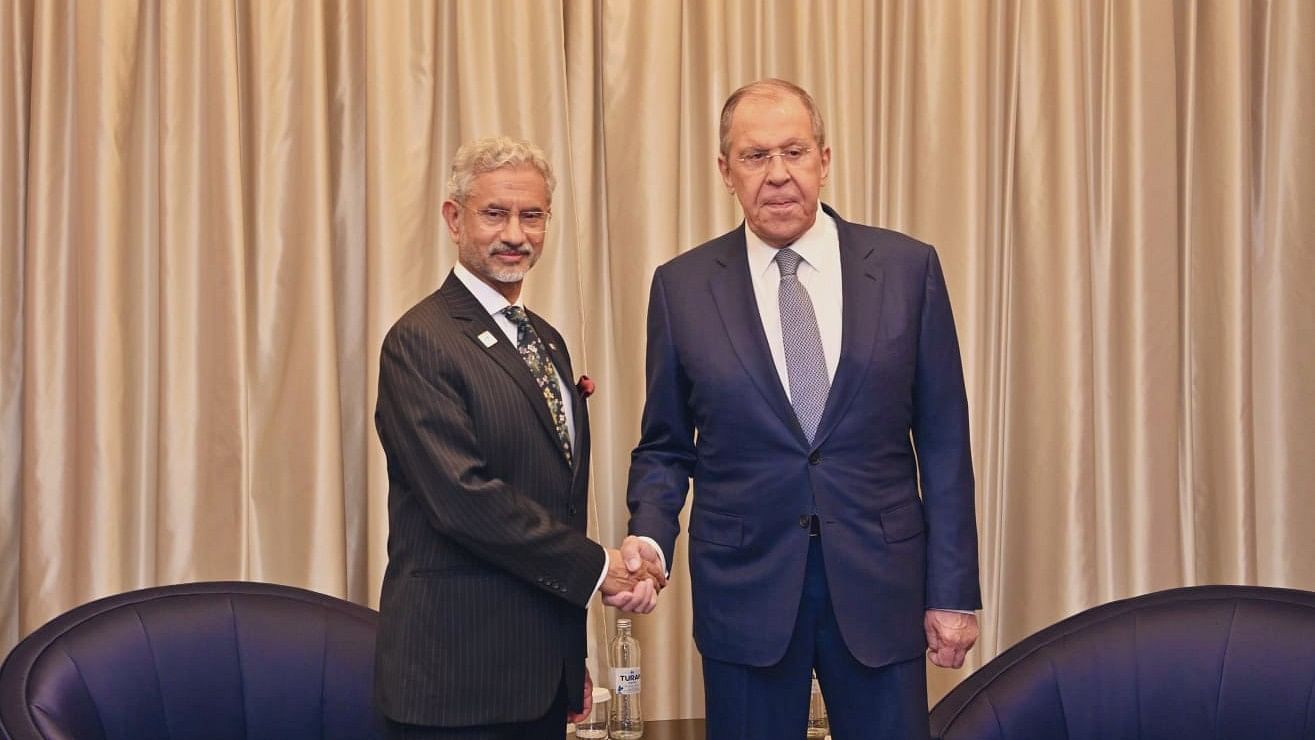
External Affairs Minister S Jaishankar and Russian Foreign Minister Sergey Lavrov.
Credit: X/@DrSJaishankar
New Delhi: Ahead of Prime Minister Narendra Modi’s meeting with President Vladimir Putin in Moscow, New Delhi on Wednesday conveyed to Russia its “strong concerns” over Indian citizens working with the former Soviet Union nation’s soldiers in the battlegrounds in Ukraine as members of the support staff.
External Affairs Minister S Jaishankar had a meeting with his Russian counterpart Sergey Lavrov on the sideline of the Shanghai Cooperation Organisation’s summit in Astana, the capital of Kazakhstan. The meeting took place just days before Modi’s summit with Putin during his proposed visit to Moscow on July 8 and 9.
Modi will hold the 22nd India-Russia annual summit with Putin during his visit to Moscow. The two leaders had held the 21st annual summit when Modi had hosted Putin in New Delhi on December 6, 2021, just a few weeks before Russia launched its “special military operations” in Ukraine on February 24, 2022.
The annual summit could not be held in 2022 and 2023. Modi, however, had a meeting with Putin on the sideline of the SCO summit at Samarkand in Uzbekistan in September 2022 – the only in-person meeting they had after Russia sent its soldiers to Ukraine. Modi then told Putin that it was not the era of war, and that dialogue and diplomacy should be the only means to resolve any conflict.
“Raised our strong concern on Indian nationals who are currently in the war zone. Pressed for their safe and expeditious return,” Jaishankar posted on X after he met Lavrov in Astana on Wednesday.
Two more citizens of India working with the soldiers of Russia as members of the support staff were killed in the conflict zone of Ukraine early this month. Earlier, in February and March this year, two Indians – Mohammed Afsan of Hyderabad and Hemil Ashvinbhai Mangukiya of Surat – had been killed while working with the Russian Army units in Ukraine as members of the support staff.
The Central Bureau of Investigation in early March conducted raids in 15 locations in seven cities and busted a human trafficking racket that had recruited youths from India for jobs in Russia and sent them to the former Soviet Union nation, only to be forced to work as members of the support staff of the Russian Army in the battlegrounds of Ukraine. Several of them later got in touch with the Embassy of India in Moscow and even posted videos online seeking help from New Delhi to safely return home.
New Delhi asked Moscow for “a verified stop” to any further recruitment of the citizens of India by the Russian Army. The Ministry of External Affairs in New Delhi also stated that making the citizens of India work for the Russian Army would not be “in consonance” with the partnership between the two nations.
The Government of India urged the people of the country to be cautious while seeking employment opportunities in Russia.
Randhir Jaiswal, the spokesperson of the MEA, recently told journalists in New Delhi that the government could so far bring back home around 10 of the 20-25 citizens of the country who had got in touch with New Delhi’s diplomatic mission in Moscow after being forced to work for the Russian Army.
The issue is likely to come up for discussion during Modi’s meeting with Putin in Moscow, although both sides are keen to make it sure that it does not become an irritant in bilateral relations.
New Delhi drew flak from the US and the rest of the West for not joining the clamour against Russia after the former Soviet Union nation launched its “special military operations” in Ukraine on February 24, 2022. New Delhi has been maintaining a strategic balance in its ties with Russia and the US-led West.
India’s decades-old strategic partnership with and its dependence on the Soviet Union and its successor Russia for military hardware appeared to have stopped New Delhi from speaking up against Moscow. India has been circumventing sanctions imposed by the US and the rest of the West on Russia and continued bilateral trade. It also increased oil and coal imports from Russia.
Jaishankar wrote on X that he and Lavrov had also “discussed the global strategic landscape and exchanged assessments and views”.
